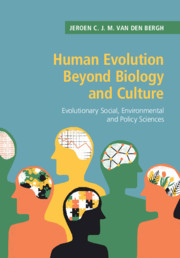Book contents
- Human Evolution Beyond Biology and Culture
- Human Evolution Beyond Biology and Culture
- Copyright page
- Contents
- Preface
- Part I Prevue
- Part II Evolutionary Biology
- Part III Bridging Natural and Social Sciences
- Part IV Evolutionary Social Sciences
- Part V Evolutionary Cultural History
- Part VI Evolutionary Environmental and Policy Sciences
- 13 Survival of the Greenest
- 14 Evolving Solutions for Climate Change
- 15 Evolutionary Policy and Politics
- 16 Evolutionary Futures
- References
- Index
- Plate Section (PDF Only)
15 - Evolutionary Policy and Politics
from Part VI - Evolutionary Environmental and Policy Sciences
Published online by Cambridge University Press: 28 September 2018
- Human Evolution Beyond Biology and Culture
- Human Evolution Beyond Biology and Culture
- Copyright page
- Contents
- Preface
- Part I Prevue
- Part II Evolutionary Biology
- Part III Bridging Natural and Social Sciences
- Part IV Evolutionary Social Sciences
- Part V Evolutionary Cultural History
- Part VI Evolutionary Environmental and Policy Sciences
- 13 Survival of the Greenest
- 14 Evolving Solutions for Climate Change
- 15 Evolutionary Policy and Politics
- 16 Evolutionary Futures
- References
- Index
- Plate Section (PDF Only)
Summary
- Type
- Chapter
- Information
- Human Evolution beyond Biology and CultureEvolutionary Social, Environmental and Policy Sciences, pp. 433 - 450Publisher: Cambridge University PressPrint publication year: 2018



